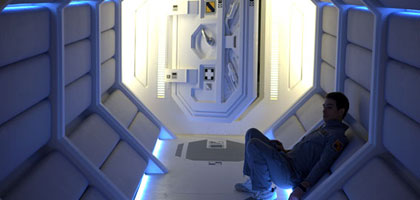Primary navigation

UK 2008

Reviewed by Philip Kemp
Our synopses give away the plot in full, including surprise twists.
The future. Helium-3, a source of clean energy, is mined by Lunar Industries from the far side of the moon. The automated mining process is supervised by one man, Sam Bell, who is looked after by a mobile computer called Gerty. Sam, nearing the end of his three-year stint, can't communicate directly with Earth as the communication satellite has apparently broken down, but he receives taped messages from his wife Tess and little daughter Eve. When one of the giant helium-harvesting machines breaks down, Sam goes out in a rover to fix it. Distracted by a hallucination, he crashes the rover and is injured.
Sam wakes up in the infirmary, bewildered. Gerty tells him he has been unconscious for a few days and has suffered some memory loss. Avoiding Gerty's supervision, Sam goes outside to the rover and finds the injured Sam 1. Sam 2 brings Sam 1 back to the base. Initially hostile, each taking the other for a clone, they come to recognise they're both clones. Gerty admits they've been given edited memories from the original Sam Bell. Lunar announces that a rescue unit is on its way to repair the harvester; the Sams realise part of its job will be to kill them both.
Sam 2 discovers a chamber of Sam clones. Surmising that the base is blocked from connecting with the fully functioning satellite, the Sams travel outside the blocking perimeter. Trying to reach Tess, Sam 1 contacts Eve, now 15, who tells him Tess died years ago. With Sam 1 deteriorating fast, Sam 2 puts him back in the crashed rover to be found by the rescue unit. Back at the base Sam 2 moves a new Sam into the infirmary. Gerty volunteers to erase its memory banks so that there will be no record of what Sam 2 has done. As the rescue unit docks and the new Sam awakes, Sam 2 blasts off in a transporter; the dying Sam 1 watches him go. On Earth, Sam 2 publicly denounces Lunar.
Moon is an old-fashioned sci-fi movie in the best sense: far more psychological drama than space opera, dispensing with overweening CGI and loud flashy action sequences while harking back to subtler, more ideas-driven entries in the genre such as Solaris, Silent Running and Dark Star. Its closest cousin, though, is Aaron Lipstadt's neglected 1982 feature debut Android - which is likewise set in an isolated outpost in space and plays with questions of who is or isn't fully human. There's also a nod to 2001: A Space Odyssey in the person of resident computer Gerty (smoothly voiced by Kevin Spacey), and we're kept guessing until almost the end whether the benevolently soft-spoken gizmo will eventually do a HAL and turn nasty.
Spacey's vocal performance apart, almost all the acting burden falls on the shoulders of Sam Rockwell, whose everyman quality and non-movie-star looks make him ideal casting as the lonely mining operative Sam Bell, isolated on the far side of the moon. Building on his doppelgangerish portrayal of Chuck Barris in Confessions of a Dangerous Mind (self-hating TV schlockmeister/cold-blooded CIA hitman), Rockwell skilfully differentiates his two cloned personae - Sam 1, petulant and sentimental, and Sam 2, brash and impatient - while never losing sight of them as two aspects of the same person. It's a tour de force to rank with Jeremy Irons' dual role in Dead Ringers.
The shifting relationship between the two Sams lies at the heart of the film, as they reluctantly come to accept rather than resist their affinity, each brought to realise he's at once less alone, and far more alone, than he ever imagined. Director Duncan Jones rightly expends most of his SFX budget on making the interplay between them convincing, especially when they're fighting or playing ping-pong. The interior of the base is appropriately low-tech and lived-in; scenes set on the moon's surface are functional but perfectly adequate. Elsewhere Jones turns the limitations of his $5 million budget to witty use: Gerty expresses its reactions through a small screen that displays a range of elementary emoticons, which is vivid and oddly endearing.
There's a hint of a political message - the way big corporations chew up their workers and spit them out - but Nathan Parker's script never rams it home. (And in any case it would hardly be new, even in sci-fi movies: Fritz Lang's Metropolis got there more than 80 years ago.) The overall mood of the film is melancholy rather than angry, not least the desolate moment when Sam learns that his beloved wife is long dead and his teenage daughter doesn't even know him. And still worse, that they aren't really 'his' wife and daughter. Some reviewers have complained that the main twist is predictable, but that's not really the point. Moon isn't a mystery thriller, and most of us will work out what's coming; the interest lies in how and when Sam will discover it, and how he'll react. Jones (formerly Zowie Bowie, David's son, but who could blame him for the name change?) has made an intelligent, individual feature debut; on the strength of this, he'll be one to watch.